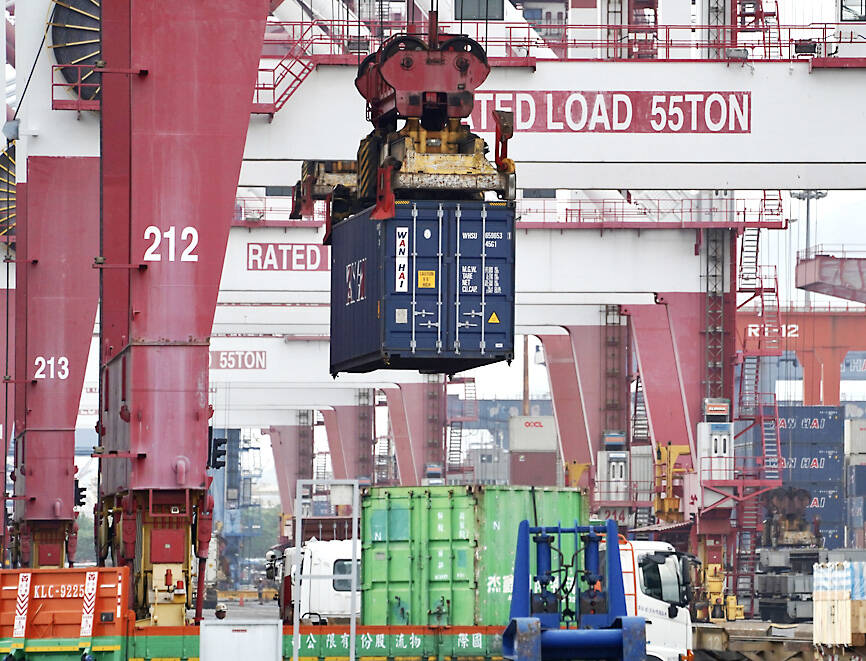Export orders fell at the slowest pace in about 10 months, at an annual rate of 12 percent, to US$47.73 billion last month, aided by major orders received by a local memorychip maker and a networking chip distributor as customers boosted global supply chain resilience, the Ministry of Economic Affairs said yesterday.
New orders for electronics and for information and communications technology (ICT) products last month beat the expectations of the ministry, Department of Statistics Director Huang Yu-ling (黃于玲) said via telephone.
Robust demand for artificial intelligence (AI)-enabled servers also helped buoy the weakness in outbound demand for Taiwanese goods, Huang said.

Photo: CNA
On a monthly basis, export orders expanded 8 percent from US$44.18 billion in June. During the first seven months of the year, export orders plummeted 27.9 percent year-on-year to US$316.3 billion as macroeconomic uncertainty dented demand.
With the electronics industry entering its peak season, the ministry expects export orders this month to drop 1.5 percent month-on-month to US$47 billion, or to grow 2.7 percent sequentially to US$49 billion. That represents an annual decline of 10.2 percent to 13.9 percent.
“For the third quarter, we expect the decline in export orders to be milder, helped by seasonal upticks and the introduction of new consumer electronics,” Huang said. “We also believe there is a chance to see export orders swing back to growth in the fourth quarter, thanks to the AI boom, improved supply chain inventory and a lower base.”
Overall, the ministry remains cautious about the lingering impact of high inflation and the central banks’ tight monetary policy on consumer spending behaviors, as well as a disappointing economic recovery in China, Huang said.
Orders for electronic products, primarily semiconductors, last month shrank 0.4 percent year-on-year to US$17.7 billion, on faltering demand for foundry services, chip testing and packaging services and printed circuit boards. Demand for memory chips and networking chips helped absorb some declines, the ministry said.
Orders for ICT products last month fell 14.9 percent year-on-year to US$12.73 billion, due to lower demand for notebook computers and networking devices. That was a monthly increase of 3.6 percent, aided by higher demand for AI servers.
Orders for optoelectronic products fell 4.6 percent year-on-year to US$1.65 billion because of flagging demand for camera lenses and backlight modules. Higher average selling prices of TV flat panels helped minimize the declines. On a monthly basis, orders expanded 2.2 percent.
Orders for base metals, mainly steel, slumped 19.4 percent year-on-year to US$2.07 billion, due to weak demand and lower average selling prices. That represented monthly growth of 1.2 percent.
Orders for machine tools plummeted 24.6 percent year-on-year to US$1.47 billion, or 9.2 percent month-on-month, as a weak global economy prevented businesses from investing in new equipment.
Order for plastics products sank 18.7 percent year-on-year, or up 1.6 percent month-on-month, to US$1.58 billion, while orders for petrochemical products plunged 25.4 percent year-on-year, or up 1.48 percent month-on-month, to US$1.48 billion, due to weak market demand and a supply glut.
Lower global crude oil prices also affected the outcome, with the average price falling by 25.3 percent year-on-year to US$81.06 per barrel.

Taiwanese suppliers to Taiwan Semiconductor Manufacturing Co. (TSMC, 台積電) are expected to follow the contract chipmaker’s step to invest in the US, but their relocation may be seven to eight years away, Minister of Economic Affairs J.W. Kuo (郭智輝) said yesterday. When asked by opposition Chinese Nationalist Party (KMT) Legislator Niu Hsu-ting (牛煦庭) in the legislature about growing concerns that TSMC’s huge investments in the US will prompt its suppliers to follow suit, Kuo said based on the chipmaker’s current limited production volume, it is unlikely to lead its supply chain to go there for now. “Unless TSMC completes its planned six

Power supply and electronic components maker Delta Electronics Inc (台達電) yesterday said second-quarter revenue is expected to surpass the first quarter, which rose 30 percent year-on-year to NT$118.92 billion (US$3.71 billion). Revenue this quarter is likely to grow, as US clients have front-loaded orders ahead of US President Donald Trump’s planned tariffs on Taiwanese goods, Delta chairman Ping Cheng (鄭平) said at an earnings conference in Taipei, referring to the 90-day pause in tariff implementation Trump announced on April 9. While situations in the third and fourth quarters remain unclear, “We will not halt our long-term deployments and do not plan to

‘SHORT TERM’: The local currency would likely remain strong in the near term, driven by anticipated US trade pressure, capital inflows and expectations of a US Fed rate cut The US dollar is expected to fall below NT$30 in the near term, as traders anticipate increased pressure from Washington for Taiwan to allow the New Taiwan dollar to appreciate, Cathay United Bank (國泰世華銀行) chief economist Lin Chi-chao (林啟超) said. Following a sharp drop in the greenback against the NT dollar on Friday, Lin told the Central News Agency that the local currency is likely to remain strong in the short term, driven in part by market psychology surrounding anticipated US policy pressure. On Friday, the US dollar fell NT$0.953, or 3.07 percent, closing at NT$31.064 — its lowest level since Jan.

The New Taiwan dollar and Taiwanese stocks surged on signs that trade tensions between the world’s top two economies might start easing and as US tech earnings boosted the outlook of the nation’s semiconductor exports. The NT dollar strengthened as much as 3.8 percent versus the US dollar to 30.815, the biggest intraday gain since January 2011, closing at NT$31.064. The benchmark TAIEX jumped 2.73 percent to outperform the region’s equity gauges. Outlook for global trade improved after China said it is assessing possible trade talks with the US, providing a boost for the nation’s currency and shares. As the NT dollar